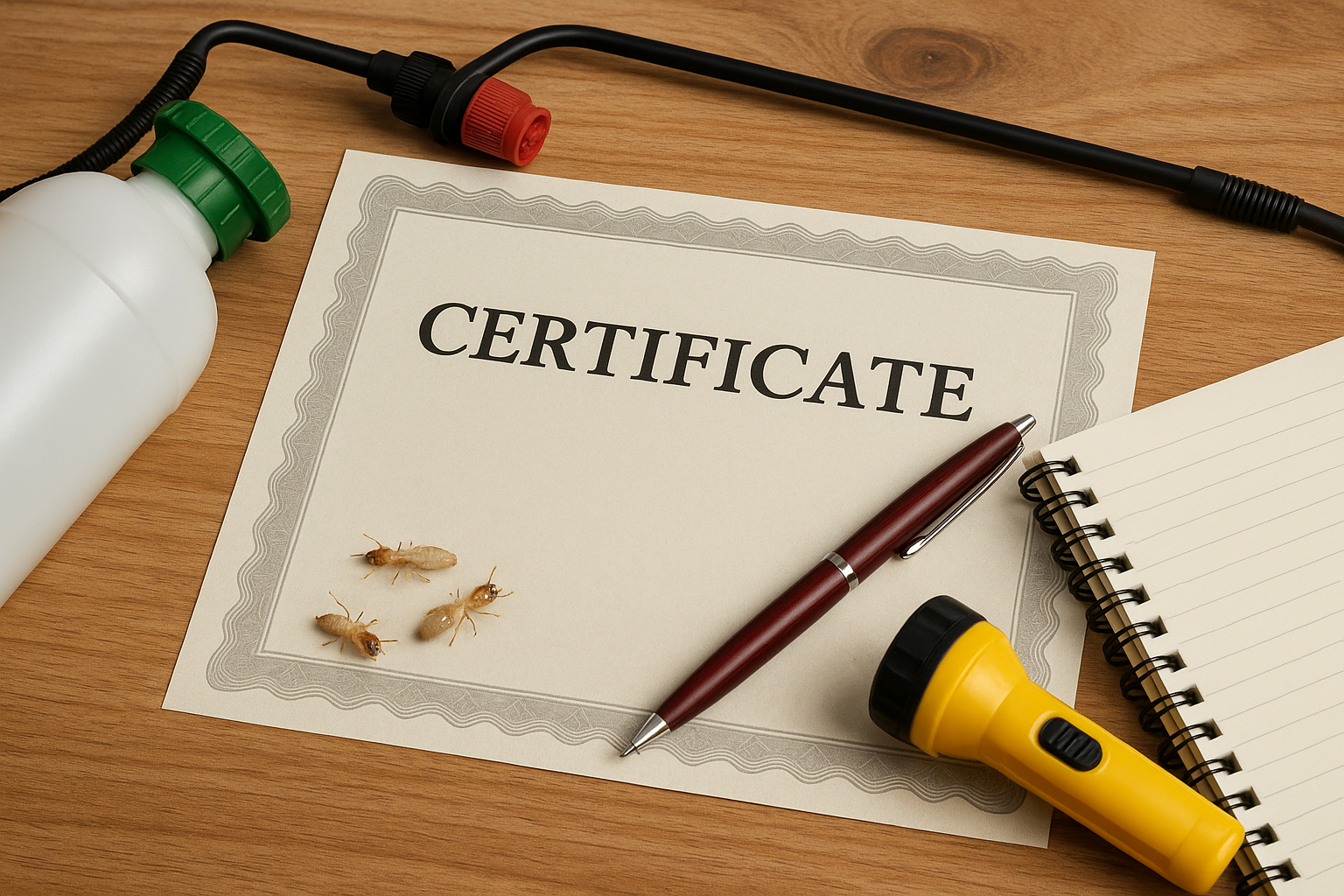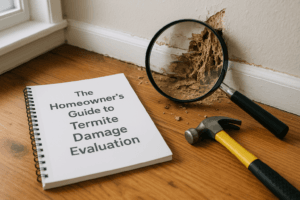Living in the Valley means dealing with three certainties: blistering heat, endless construction traffic, and eventually, termites. It’s a rattle everyone in Maricopa County hears eventually, but fixing it requires a lot more than just a brave face and a generic bucket of spray from the hardware store. Choosing the right help starts with understanding the one thing that separates the pros from the well-meaning amateurs: certification.
Contents
Why Should You Even Care About a Piece of Paper?
Honestly, I get it. When you see a mud tube crawling up your foundation stem wall, your first instinct is panic, not checking credentials. You just want the bugs gone, yesterday. But here’s the thing—termite control isn’t just about killing bugs; it’s about applying chemical barriers around the place you sleep, eat, and raise your kids.
In Arizona, the Office of Pest Management (OPM), which falls under the Arizona Department of Agriculture, doesn’t mess around. They regulate this industry tighter than a drum because the chemicals we use—like Termidor HE or fipronil—are powerful tools. In the hands of a certified pro, they are safe and save your home. In the hands of someone who “knows a guy,” they can be a health hazard or, ironically, totally ineffective against our stubborn desert termites.
You wouldn’t let a dentist operate on your teeth just because he owns a drill, right? It’s the same logic here. Certification is the proof that the technician understands biology, safety protocols, and the unique construction of Arizona homes, from post-tension slabs to floating basements.
The “Alphabet Soup” of Certification
If you’ve ever looked at a pest control website and felt like you were reading a foreign language, you aren’t alone. The industry loves its acronyms. But knowing a few of these can save you a headache later.
In Arizona, we have different tiers of licensing. It’s not a “one size fits all” badge.
- Applicator: This is the person actually holding the wand. They have passed core exams and specific category exams (like wood-destroying organisms). They know the difference between a Subterranean termite and a Drywood termite, which is crucial because you treat them in completely different ways.
- Qualifying Party (QP): Think of this as the boss level. This person is responsible for the license of the Business. They ensure everything the company does is legal, safe, and effective.
- Business License: The company itself must be registered. If they can’t show you a business license number, keep your door locked.
Here is a quick breakdown of what you get with a certified pro versus a handyman:
| Feature | The “Handyman” Special | Arizona Termite Control Certified Pro |
|---|---|---|
| Knowledge Base | Guesswork & YouTube tutorials | State-mandated exams & continuing education |
| Chemical Access | Over-the-counter (weak concentration) | Professional-grade (Termidor, Altriset) |
| Warranty | A handshake and “good luck” | Legally binding service guarantees |
| Insurance | Probably none (liability is on you) | Fully bonded and insured |
It’s More Than Just Taking a Test
You might be thinking, “Okay, so they passed a multiple-choice test. Big deal.” But let me explain what actually goes into maintaining that certification. It’s not a one-and-done event.
To keep a license active in Maricopa County, technicians have to engage in Continuing Education (CE) units. This is actually my favorite part of the industry, believe it or not. We have to constantly learn about new invasive species, updates in chemical safety labels, and better application methods.
For example, the way we treat a home with a post-tension slab today is different than how it was done fifteen years ago. If a technician isn’t keeping up with their certification credits, they might drill into a tension cable in your foundation. That is a massive, expensive disaster. Certification ensures the person drilling holes in your concrete knows exactly where the danger zones are.
Plus, there’s the background check aspect. These regulators require fingerprinting and background checks. When you invite someone into your backyard or your living room, knowing they’ve been vetted adds a layer of comfort that you just can’t put a price on.
The Arizona Factor: Why Local Certification Matters
We have a saying in the industry: “There are two types of homes in Arizona—those that have termites, and those that will.”
Our environment is unique. The Sonoran Desert creates specific pressures on a home. The soil here is often hard-packed caliche or shifting clay. A technician certified in a place like Florida or Oregon might know termites, but they don’t know Arizona termites.
Heterotermes aureus, our common desert subterranean termite, is aggressive. They can survive in drier conditions than their cousins back east. A locally certified technician understands the foraging patterns of these specific Pests. We know that when the monsoons hit in July and August, the swarming begins.
A certification issued by the Arizona Department of Agriculture means the technician has demonstrated competence specifically for this region. They understand how our intense UV index breaks down chemicals if they aren’t applied correctly, and how to trench around a home without disturbing the desert landscaping you paid a fortune for.
Red Flags: How to Spot a Fake
You know what? It breaks my heart when I see homeowners get taken for a ride. It happens more than you’d think. Scammers love the termite season because fear is a great motivator.
Here is how you can spot someone who might be faking their credentials:
- The “Leftover” Pitch: They knock on your door and say, “Hey, I have some leftover chemical from a job down the street, I can do your house cheap.” Professional termite control doesn’t work like that. We calculate precise measurements for each home.
- No PMD Number: Every truck should display a license number. Every quote should have one. If it’s missing, ask why. If they get defensive, that’s your cue to walk away.
- Cash Only: Legitimate businesses take cards, checks, and offer financing. If they demand cash upfront and refuse to give a written receipt, they are likely dodging the state regulators.
Honestly, if it feels sketchy, it probably is. Your home is likely your biggest financial asset. Don’t risk it to save a few bucks on an uncertified job that you’ll just have to pay us to fix six months later anyway.
Protecting Your Home the Right Way
At the end of it all, certification is about trust. It’s the industry’s way of telling you, “We know what we’re doing, and we promise to do it safely.” It bridges the gap between a scary infestation and a secure home.
We take this seriously because we live here too. We know how awful it feels to see that sawdust pile or that mud tube. We put in the hours, take the exams, and keep learning every year so that when we show up at your door, you can breathe easy.
Don’t leave your home’s safety to chance or to someone who treats pest control as a side hustle. You deserve the peace of mind that comes with a true professional.
Ready to protect your home?
Give us a call at 480-660-3093 to speak with a certified expert right now.
Request a Free Inspection today and let us show you the difference experience makes.




